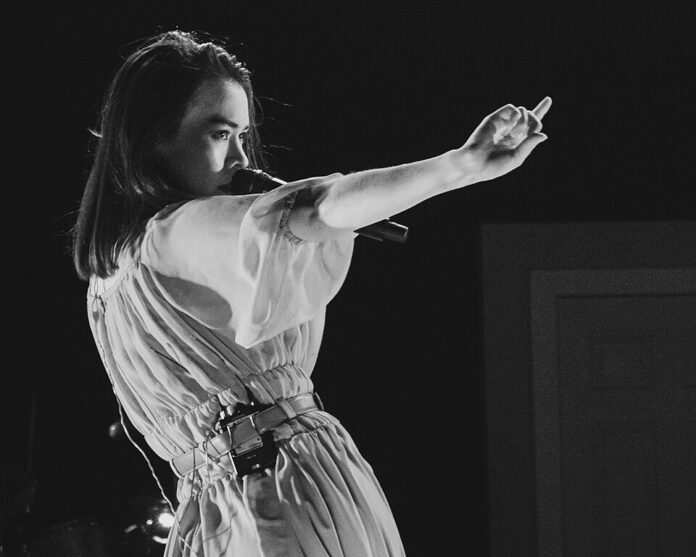Nora Yoon ’27 is a chemistry major. They enjoy writing poetry for the campus literary magazine, The Gallery and reading whatever books have a good vibe to them. They also like sitting by large bodies of water, drinking lots of coffee and overthinking movies, songs and things in general. Contact them at giyoon@wm.edu.
The views expressed in the article are the author’s own.
Once called the “21st Century’s Poet Laureate of Young People” by NPR, Mitski has shored up various titles, viral songs and even some conspiracy theories (that her father is a CIA operative and that she moonlights as a human trafficker). All this to say, at least some people, mostly young women and queer people, will have a strong reaction to hearing a Mitski song — or even just hearing her mentioned. But what about Mitski earns her this cult following that has people writing fervent opinion articles about her? Simply her dedication and discipline to what she, as an artist, creates: her music.
This is predictable enough, but what endures in Mitski’s discography, what makes her music impossible to get tired of is that every song is as full as an emotion, impossible to summarize. The core of her songs exact meaningful moments for every second they continue, part of the reason they’re so short. In a profile for Vulture, Alex Jung writes that “a Mitski song lasts about as long as it takes to poach an egg.” I have musically-inclined friends who have told me that Mitski’s instrumentation is not innovative enough or that her chord progressions are too simple, but I think that to understand Mitski is to apply a different lens than glancing over the music and only giving it serious attention later. Her production is not boring. Every album’s sound is distinct and coherent, but it is true that only close attention to Mitski’s lyrics and melody will reveal the totality of her prowess as an artist. One can casually enjoy Mitski, only hearing a few lines and enjoying other elements of the music, but they miss so much. Mitski songs can seem simple because they do not strain to be difficult; that is how they evoke feeling, how they remain as strange and ephemeral as moments when we really feel human. Giving Mitski’s music that respect yields admiration and close awareness of our own emotions. She has said herself: the lyrics and melody are the essential medium of her music, and hearing these two elements alone (in live recordings or demos) reveals how nothing else is really necessary to any of her songs.
But what makes her songs, these modern kinds of lyric poems, so powerful, even without bleeding-edge production or arrangement? While Spotify casually features her in a “Sapphic” playlist, there is a deeper connection between the lyric poet Sappho and Mitski than meets the eye. In Sappho’s fragments that survive today, we read “here (once again) Muses leaving the gold.” Here (once again) Sappho cuts an insight from her words that continue to refract her experience, offering perspective into our own lives. Mitski songs function similarly, after all is said and done, because her music is not comparable, and there are no tricks of rhetoric to really underscore what it means for her to tenderly sing lines such as:
“I haven’t told anyone /Just like we promised / Have you? / Every time I drive through the city where you’re from / I squeeze a little”;
Even in the small space above, the lyrics are enhanced by the small but futile hopefulness of the song infused in its melody, in the dramatic abandon that Mitski makes use of with her voice. “Old Friend” is a good example of how much is made of the little time that her songs use, capturing the strange experience of seeing someone you once loved, held under circumstantial restraint. It begins with the lines:
“We nearly drowned / For such a silly thing / Someone who loves me now / Better than you”;
We immediately receive the undercurrent of jealousy and dissatisfaction that remains after the narrator’s relationship with the person she’s addressing, underscored by how she reluctantly sings the next two lines of the song (especially the latter), almost spitting them out:
“And that pretty friend is / Finally yours and”
— then comes the core of the song, the plea to see this person again, an exercise in appearing casual but sounding more and more frantic as the song continues, eventually demanding what it once suggested. Mitski repeats in the last chorus, interrupting herself,
“Meet me at blue diner / I’ll take coffee and talk about nothing baby / Blue diner I’ll take / Coffee and talk about nothing / Baby”;
It is her willingness to reveal herself that makes her music strikingly powerful, absent of ego in design. If she is righteous, then it is an accurate and vulnerable righteousness, never heroic, but always honest. Mitski’s emotional appeal is unfailingly earnest. She provides an important and healing voice for the modern senselessness of our lives with a commitment to a balance between simplicity and truth: something proven over and over again by every song in her discography. Despite a lack of flashiness or saturation, the subtlety of her music makes the case for contemporary lyric poets, giving us deep flashes of insight into emotion as Mitski transmutes her experiences into a condensed lyric and melody, a stream of darkness imparting love.

